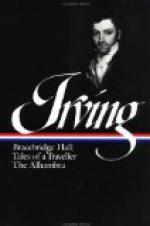On making some inquiries about him, I gathered that he was descended from a line of farmers that had always lived on the same spot, and owned the same property; and that half of the churchyard was taken up with the tombstones of his race. He has all his life been an important character in the place. When a youngster, he was one of the most roaring blades of the neighbourhood. No one could match him at wrestling, pitching the bar, cudgel play, and other athletic exercises. Like the renowned Pinner of Wakefield, he was the village champion; carried off the prize at all the fairs, and threw his gauntlet at the country round. Even to this day the old people talk of his prowess, and undervalue, in comparison, all heroes of the green that have succeeded him; nay, they say that if Ready-Money Jack were to take the field even now, there is no one could stand before him.
When Jack’s father died, the neighbours shook their heads, and predicted that young Hopeful would soon make way with the old homestead; but Jack falsified all their predictions. The moment he succeeded to the paternal farm he assumed a new character; took a wife; attended resolutely to his affairs, and became an industrious, thrifty farmer. With the family property he inherited a set of old family maxims, to which he steadily adhered. He saw to everything himself; put his own hand to the plough; worked hard; ate heartily; slept soundly; paid for everything in cash down; and never danced except he could do it to the music of his own money in both pockets. He has never been without a hundred or two pounds in gold by him, and never allows a debt to stand unpaid. This has gained him his current name, of which, by the by, he is a little proud; and has caused him to be looked upon as a very wealthy man by all the village.
Notwithstanding his thrift, however, he has never denied himself the amusements of life, but has taken a share in every passing pleasure. It is his maxim, that “he that works hard can afford to play.” He is, therefore, an attendant at all the country fairs and wakes, and has signalised himself by feats of strength and prowess on every village green in the shire. He often makes his appearance at horse-races, and sports his half-guinea and even his guinea at a time; keeps a good horse for his own riding, and to this day is fond of following the hounds, and is generally in at the death. He keeps up the rustic revels, and hospitalities too, for which his paternal farm-house has always been noted; has plenty of good cheer and dancing at harvest-home, and above all, keeps the “merry night,"[A] as it is termed, at Christmas.
[Footnote A: Merry night; a rustic merry-making in a farm-house about Christmas, common in some parts of Yorkshire. There is abundance of homely fare, tea, cakes, fruit, and ale; various feats of agility, amusing games, romping, dancing, and kissing withal. They commonly break up at midnight.]




